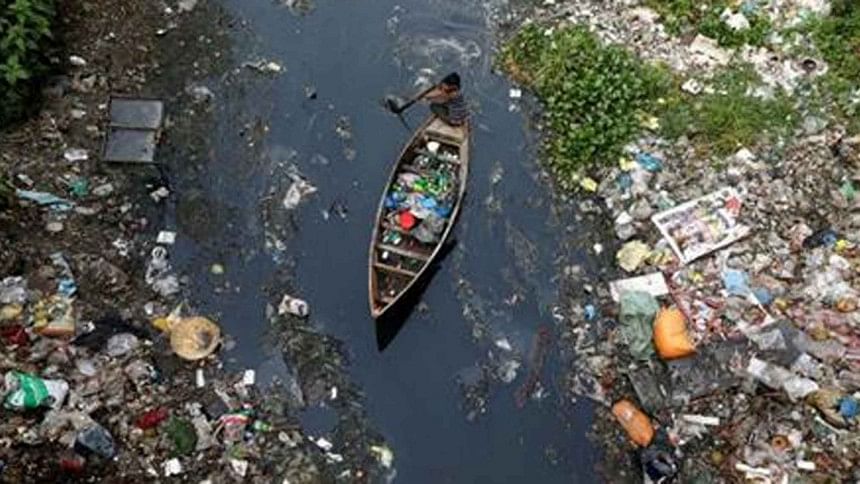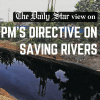Cheaper polythene bags spell disaster for the environment

Finance Minister AHM Mustafa Kamal gave the public quite the surprise when he proposed to withdraw the existing 5 percent supplementary duty on all types of polythene bags, plastic bags (including oven plastic bags) and wrapping materials made of polyethylene. To justify his move, he said the recommendation was made to reduce tax-burden at the local manufacturing stage and make the business environment friendlier. Needless to say, the proposal will appease the local manufacturers who have been seeking fiscal support and exemption from supplementary duty on all kinds of polythene bags made from polyethylene. The proposal, if endorsed in the Jatiya Sangsad during the passing of the budget at the end of this month, will help local manufacturers in more ways than one. It is expected to propel the growth of this industry, help cut the price of polythene bags in the country, and, worryingly, encourage the use of environmentally hazardous single-use polybags to a larger extent.
Does this not seem like a total shift in the government's stance against the use of polyethylene and plastic products? It was in the early 1980s when plastic products, especially polythene shopping bags, were introduced widely in the Bangladeshi market. The bags quickly gained popularity. They were light, cheap, and could be disposed of after being used only once. However, within a few years, the environmental impact of using these non-biodegradable shopping bags became all too evident. After the flood in 1998 – when the sewerage lines were found clogged with heaps of polythene bags leading to massive water-logging – the government became aware of the danger that polythene and plastic bags posed. In 2002, the government banned thin polythene and plastic bags, making Bangladesh the first country in the world to slap such a restriction. The ban, hailed as a major step towards reducing environmental pollution, worked for a few years.
But then the restrictions started to wane thanks to lax enforcement of the law and with hardly any environment-friendly alternative. Twenty years down the line, these polythene and plastic bags have become an integral part of our daily lives as they are used indiscriminately for household and industrial purposes. Be it in the supermarkets or kitchen markets, streets shops or high-end malls, the presence of polythene is everywhere because of their durability, lightweight, and low price. What is more alarming is that most consumers just throw these bags away after using them once. These bags eventually find their way into the drains, sewage pipes, canals, rivers, and open areas, polluting earth and water.
According to a World Bank study, Bangladesh's annual per capita plastic consumption in urban areas tripled in 15 years to nine kg in 2020. The problem, it found, is worse in Dhaka city, where plastic usage is significantly higher than the national average. In 2020, the per capita plastic consumption in Dhaka stood at 22 kg, up from 9.2 kg in 2005. About 646 tonnes of plastic waste was generated daily in Dhaka, which is 10 percent of all wastes generated in Bangladesh. Only 37.2 percent of the plastic waste in Dhaka was recycled, the study showed. According to a study by an environmental research group called Environment and Social Development Organisation (ESDO), over 78,000 tonnes of polybag waste generated during the pandemic period by illegal polybag manufacturers increased to half a million per day. Of the total, some 5,996 tonnes of waste were generated in Dhaka. According to Paribesh Bachao Andolan, an environmental watchdog, nearly 1,000 polythene factories operate across the country, but most of them are located in old Dhaka. A 2018 report published by Earth Day Network, a leading NGO that works on environmental issues, ranked Bangladesh 10th out of the top 20 plastic polluting countries in the world.
Polythene and plastic bags are harmful in many ways. First, these products degrade slowly and into tiny particles which then enter the food chain, posing a significant risk to humans, marine life, and ecosystems. And its decomposition takes several hundred years. Globally, managing plastic waste is increasingly becoming an environmental and economic challenge. Governments in all parts of the world have deployed policy and economic instruments, such as bans and product taxes, to disincentivise the production and consumption of "single-use" plastic products and packaging. Bangladesh also progressively took steps in curbing plastic pollution since the early 2000s with green activists and environmentalists vigorously protesting against their use. Government high-ups, ministers and policymakers, on different occasions, expressed their position against the use of polythene and plastic. The authorities sporadically conduct drives to stop the polythene menace for a few days, and then the issue is completely forgotten.
Given the reality on the ground, the finance minister's proposal for waiving the supplementary duty on all types of polythene bags would only worsen the situation. Therefore, how judicious is it to give tax cuts on the very products that were once banned? The world is waking up to the problem of plastic pollution with governments and other stakeholders starting to act. Then why should we provide incentives to a sector that is proven to pollute the environment? We cannot afford to let our businesses grow at the cost of our environment.
Wasim Bin Habib is deputy planning editor at The Daily Star.

 For all latest news, follow The Daily Star's Google News channel.
For all latest news, follow The Daily Star's Google News channel. 








Comments